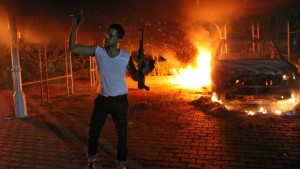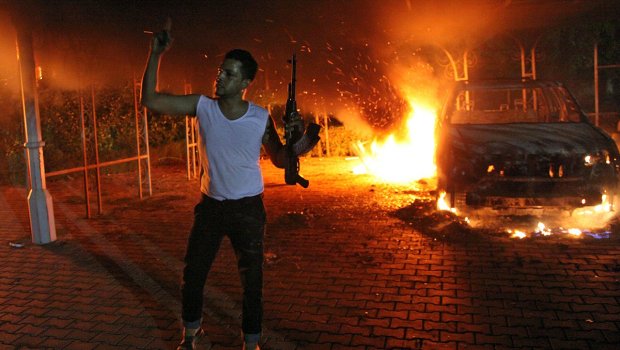2012-09-19 by Robbin Laird
Instead of flying into buildings, Muslim extremists are killing American representatives abroad.
In a vote of thanks for ending the Gaddafi repression, the American ambassador to Libya has been humiliated and killed.
In an act reminiscent of the Nazis burning down the Reichstag and blaming various ethnic undesirables, this outrage was due to an obscure film being made by an even more obscure film maker which purportedly offends whomever.
The broader policy problem is that the chaos in the Middle East only will aid Muslim extremists and fundamentalists.

The two are not the same, but both pressure the forces of democratic rule in the Middle East. And the uncertain U.S. and European support for Israel in the current period does not help either to support democracy versus chaos as the determinant of the new political order in the Middle East.
The difficulty with politicians and the media is that they have one issue fixation.
The Western and Eastern Mediterranean are seeing significant upheaval, but each event is looked at only in and of itself.
It is striking how isolated the coverage and the policies have been towards each element re-shaping the Middle Eastern puzzle.
First, we had an Iraq withdrawal by the United States with no status of forces agreement to allow the United States and notably the Air Force to play a supporting role in Iraq against Iran or other destabilizing forces in the region.
http://www.sldforum.com/2012/09/the-iraq-withdrawal-missing-the-point-and-taking-a-victory-lap/
Second, there has been the Libyan crisis with the “leadership from behind approach.”
And one result of the Libyan intervention has been the loss of significant numbers of manpads into the region. Indeed, the U.S. embassy in Libya has been significantly involved in trying to scope out the nature of the problem and approaches to dealing with it.
https://www.sldinfo.com/a-strategic-inflection-point-libyan-manpads-in-play/
Third, there has been the continuing threat from Iran, ranging from the gamut to try to shut down the straits of Hormuz to inching ever closer to acquiring nuclear weapons. Indeed, the GCC states are already acting on the assumption that Iran will end up with such weapons.
(See our Strategic Inflections report which discusses this dynamic.
https://www.sldinfo.com/products/may-2012-sip/
Fourth, there has been the Arab Spring and the elimination of several key Western allies from power. Spring seemed to miss Summer and pass into the Fall, but the President’s trip to Egypt and then to Buchenwald seems long ago, in a land far, far away.
Fifth, the Syrian repression continues unabated, with the Russians seeking to not only support the regime but to expand their influence in this key country. The impact of Syria on Iraq and Turkey to mention to key states is significant as well and generating dynamics of change in the region.
https://www.sldinfo.com/iraq-and-the-syrian-civil-war/
https://www.sldinfo.com/making-sense-of-moscow%E2%80%99s-syrian-gambit/
Sixth, there are developments in the Western Mediterranean as well, and not only in Libya. With Greece a likely expellee from the Euro zone, questions of who will underwrite Greece’s new currency provide prospects for Russia and China to expand influence in the region.
https://www.sldinfo.com/products/july-2012-sip/
Seventh, the GCC states are so concerned with Russian actions in Syria and the region, that they are considering the possibility of reducing the price of oil and using their own cash reserves to undercut the Russian economy.
The point is that there are not isolated events, certainly not in terms of their consequences.
The United States and Europe are each preoccupied with their own internal dynamics; but the world moves on without them. The impacts are significant; but the absence of policy is not the same as the absence of strategic dysfunction. Life is not a think tank; there are not simply a set of endless options.
When the Reichstag was burned down by Nazis, the world should have paid attention rather than being delusional. We have similar actions occurring now in the Middle East.
Benign neglect is not a policy; but a prescription for disaster.
And approaching a strategic upheaval with a speech written for each CNN “moment” does not prepare Western public opinion for the tough period ahead.


